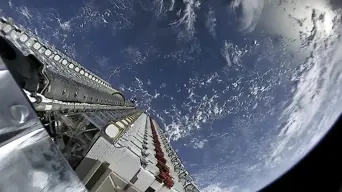Why Vodacom backs ban of Elon Musk's Starlink in SA over BEE rules
Communications regulator Icasa has released its consultation document about a proposed licensing framework for satellite services, which includes a submission from Vodacom.

Photo: Wikimedia Commons/Official SpaceX Photos
Stephen Grootes interviews Jan Vermeulen, editor of MyBroadband.
Allowing Elon Musk's Starlink to operate in South Africa is a huge source of debate, as the SpaceX-owned company balks at local BEE regulations.
The satellite internet constellation provides broadband coverage to more than 100 countries, but not here at home.
In terms of our current regulations, communication companies must be 30% black-owned.
Vodacom has now come out in support of the communication regulator's decision to bar Starlink from operating in the country.
RELATED
SA Minister's interaction with Elon Musk on X boosts hopes for Starlink arrival
Government considers amending BEE rules to allow Elon Musk's Starlink to operate in SA
The Independent Communications Authority of SA (Icasa) has released its consultation document about a proposed licensing framework for satellite services, indicating that the submissions it received include Vodacom's.
Vodacom's point is that Starlink should be subject to the same rules as other telecommunications companies in South Africa.
“If Icasa wishes to amend local presence or B-BEEE requirements, it should do so for all market players, including mobile operators, through a transparent consultation process.”
Vodacom
One part of Vodacom's position is about them asking for a level playing field, and they're not alone in that, says MyBroadband editor Jan Vermeulen.
"I don't think Vodacom cares one way or the other about BEE except to maybe placate their PIC shareholders - it's to make sure they don't operate at a disadvantage to an overseas operator.... similar to how broadcasters complain about the fact that streamers like Netflix don't need the same broadcasting license to offer their services here."
Jan Vermeulen, Editor - MyBroadband
Where it gets interesting, Vermeulen says, is that Vodacom wants Icasa to put up guardrails when it comes to direct-to-device services (to your smartphone, for instance) in South Africa.
"This is essentially to force operators like Starlink to come to commercial arrangements with terrestrial operators like themselves BEFORE they can offer direct-to-device commercial services."
Jan Vermeulen, Editor - MyBroadband
"If the satellite operator wants to use regular cellphone spectrum then it would have to enter into some kind of arrangement with the operators on the ground to use their spectrum... but if they have their whole own spectrum, then it should absolutely not involve the local operators at all."
Jan Vermeulen, Editor - MyBroadband
Scroll up to the audio player to listen to the interview, and click here to read Vermeulen's detailed report